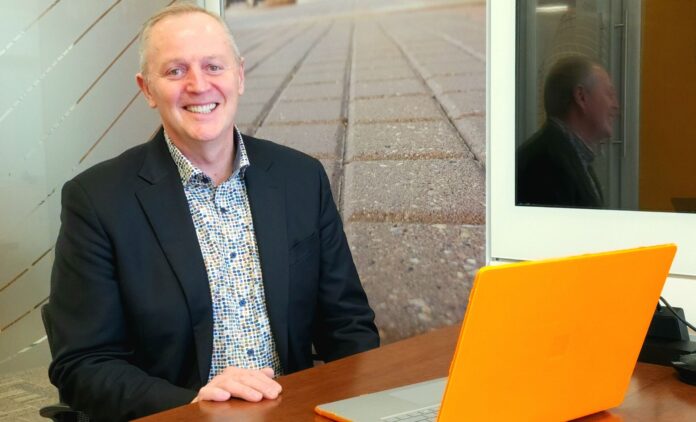Glenn Stang has been in finance for over four decades. As he retires as chief executive officer of Lloydminster’s Synergy Credit Union on Dec. 31, Synergy is on the cusp of merger talks with two Saskatchewan credit unions. Glenn reflects on the next chapter of his life.
Question 1: Share about your career in the credit union industry
Stang: I began my credit union career in September 1981 in Luseland, where I worked for three years. I then spent three years in Macklin, ten years in Rosetown, and twenty-seven years in Lloydminster.
Starting on the frontline, I progressed through various roles including accounting and finance, marketing, IT, office management, Lloydminster Branch Manager, Chief Operating Officer, and Chief Executive Officer. I spent nineteen years at the executive level, and twelve years as CEO.
Throughout my career, I engaged in a lot of just-in-time learning. In 2015, I achieved my Certified Chief Executive (CCE) accreditation, a three-year course offered in one-year increments through Wharton University of Pennsylvania, Johnson-Cornell University, and Darden School of Business – University of Virginia. This was truly a once-in-a-lifetime opportunity for me.
Question 2: Forty-three years is a long time to be in one industry. Apart from technology, how would you assess the changes you have witnessed?
Stang: Technology has undoubtedly been the most significant change. Other major changes include evolving people’s expectations, shifts in culture, increased competition, and stricter regulations.
People’s expectations have transformed dramatically, partly due to technology that allows them to manage their finances from their phones. Additionally, people are more mobile than ever, leading to different needs and expectations.
Today, we place a strong emphasis on culture, particularly regarding our staff. Employees now expect their employers to be values-based, offer greater opportunities for self-fulfillment and purpose, and provide flexibility to balance work and life. When a company strikes the right balance, it can attract and retain talent more effectively. Happy staff, in turn, provide better service to members. I believe Synergy has excelled in this area.
Our competition now comes from non-financial sectors like Fintechs. These companies focus on simplifying and improving specific financial transactions. However, they are not regulated to the same extent as financial institutions, giving them a competitive edge. To stay relevant, we partner with Fintechs and integrate their services to enhance our effectiveness. This often involves using multiple Fintech solutions to create comprehensive offerings, like our banking app, which can be challenging to manage when issues arise.
Regulation has always been a significant factor for financial institutions, and the regulatory burden continues to grow. Most regulations add costs and complexity without generating new revenue streams, making it a challenging aspect of doing business.
Question 3: What challenges have you seen Synergy overcome in your tenure?
Stang: At Synergy, I’ve faced numerous challenges, including the financial crisis in 2008, the energy crisis in 2014, the pandemic in 2020, and more recently, navigating the open banking framework to ensure Synergy remains relevant for its members. There is never a shortage of challenges.
Question 4: As Synergy moves to merge and grow, what do you see as the core values that will remain?
Stang: Credit unions are cooperative financial institutions, and Synergy operates within the seven cooperative principles, which set us apart from banks. Here are a few key principles:
- Principle 1: Voluntary and Open Membership – This principle speaks for itself, emphasizing inclusivity and accessibility.
- Principle 3: Members’ Economic Participation – At Synergy, this is embodied in our profit shares program. Each year, we return 20 per cent of our pre-tax profits to members as profit shares. The merged credit union is committed to the cooperative principle of economic participation and will prioritize the development of a future patronage philosophy.
- Principle 4: Education, Training, and Information – We aim to help members achieve financial wellness through education and information sharing. This includes financial literacy programs, fraud awareness, and personalized financial planning.
- Principle 7: Concern for Community – Synergy allocates 5 per cent of its pre-tax profits to Synergy Shares, a program that supports community economic initiatives, social infrastructure, and student bursaries and scholarships.
Lastly, credit unions pride themselves on being responsive. Unlike other financial institutions, credit unions can quickly address local incidents and member needs. You can call your credit union CEO, and they will respond.
Question 5: What are your next steps upon retirement?
Stang: My initial plans involve addressing our long-postponed vacation plans with my spouse, who has sacrificed a lot to support my career. We plan to travel more in our RV, enjoying the freedom to move at our own pace.
I also intend to stay busy by participating in an executive coaching group and serving on several not-for-profit boards. My spouse and I plan to continue volunteering and tackling activities we’ve previously put off due to time constraints.
Question 6: As you retire, what’s the number one piece of advice you are giving to yourself?
Stang: Retirement is a time to refocus on what is truly important, and in some cases, completing things that have been delayed far too long – bucket lists. It is so important to stay active – physically, mentally, and spiritually. This ensures balance and keeps you healthy.
The outgoing CEO shares his parting words as he leaves the organization.
Stang: I am confident that Synergy is in excellent hands. Trevor Beaton, who has been with Synergy for 25 years, has been announced as the new CEO. He, along with his team—Brent, Christine, Harmolk, and Miranda—deeply understands credit unions and Synergy’s unique approach.
While many things will evolve, the core principles of member responsiveness and cooperative values will remain steadfast.
The legacy here is strong and vibrant, and I am truly grateful that it will continue to thrive long after my retirement.



